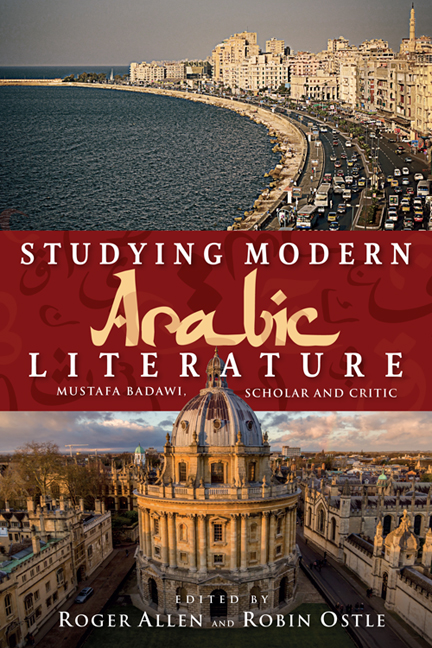Book contents
- Frontmatter
- Contents
- List of Figures
- Introduction
- Part I Alexandria to Oxford
- Part II The Academic Legacy
- 5 Beginning and End: Exploring the Qur'anic ‘Grand Story’
- 6 Modern Arabic Literature as Seen in the Late Nineteenth Century: Jurji Murqus's Contribution to Korsh and Kirpichnikov's Vseobshchaya Istoria Literatury
- 7 The ‘Second Journey’ (Al-Rihla al-thaniya) of Muhammad al-Muwaylihi's Hadith 'Isa Ibn Hisham Revisited
- 8 Ataturk Becomes 'Antar: Nationalist-vernacular Politics and Epic Heroism in 1920s Egypt
- 9 Jewish Arabs in the Israeli Asylum: A Literary Reflection
- 10 Strange Incidents from History: Youssef Rakha and his Sultan's Seal
- 11 Towards a Comparative Approach to Arabic Literature
- 12 Does Literature Matter? The Relationship between Literature and Politics in Revolutionary Egypt
- Notes on the Contributors
- Index
6 - Modern Arabic Literature as Seen in the Late Nineteenth Century: Jurji Murqus's Contribution to Korsh and Kirpichnikov's Vseobshchaya Istoria Literatury
from Part II - The Academic Legacy
Published online by Cambridge University Press: 05 August 2016
- Frontmatter
- Contents
- List of Figures
- Introduction
- Part I Alexandria to Oxford
- Part II The Academic Legacy
- 5 Beginning and End: Exploring the Qur'anic ‘Grand Story’
- 6 Modern Arabic Literature as Seen in the Late Nineteenth Century: Jurji Murqus's Contribution to Korsh and Kirpichnikov's Vseobshchaya Istoria Literatury
- 7 The ‘Second Journey’ (Al-Rihla al-thaniya) of Muhammad al-Muwaylihi's Hadith 'Isa Ibn Hisham Revisited
- 8 Ataturk Becomes 'Antar: Nationalist-vernacular Politics and Epic Heroism in 1920s Egypt
- 9 Jewish Arabs in the Israeli Asylum: A Literary Reflection
- 10 Strange Incidents from History: Youssef Rakha and his Sultan's Seal
- 11 Towards a Comparative Approach to Arabic Literature
- 12 Does Literature Matter? The Relationship between Literature and Politics in Revolutionary Egypt
- Notes on the Contributors
- Index
Summary
Mustafa Badawi's contribution to the study of modern Arabic literature has been immense, indeed one can hardly imagine what the field would have looked like without it, at least in the English-speaking world. His teaching and writing in Oxford over some thirty years stimulated interest in what in the 1960s was a little-known and undervalued subject and it laid the foundations for much subsequent research. His scholarly achievements were even more influential because they were combined with a gift for friendship and with commitment and great generosity toward his students.
It was not academic considerations that brought Mustafa to Oxford, however, nor was he the first scholar of literature from the Arab world to move to Europe for personal reasons. Among earlier academic migrants was the Syrian Jurji Ibrahim Murqus (1846–1912); his account of modern Arabic literature is the subject of this chapter. The son of a Greek Orthodox priest, Jurji Murqus left Damascus in 1860. After secondary education in Constantinople he studied at the Faculty of Oriental Languages of the University of St Petersburg, being awarded a silver medal for his dissertation on the speeches, letters and sayings ascribed to the Caliph 'Ali, and was then appointed to teach Arabic at the Lazarev Institute of Oriental Languages in Moscow. There he worked until 1900, when he retired with the rank of general. In 1906 poor health caused him to return to Syria, and he spent the last years of his life in Zahle.
Krachkovskii characterises Murqus as conscientious but not outstanding either as a teacher or as a scholar; nor was he very familiar with the contemporary state of scholarship. The disparate subjects he published on include the situation of the Oriental Christians, carrier pigeons in the East and the Mu 'allaqa of Imru' al-Qays, which he translated into Russian. He performed an important public service with his articles supporting the (Arab) Greek Orthodox Christians of Syria in their struggle for their national rights over against the Greek higher clergy, which were based on his knowledge of both the Arab and the Greek Orthodox worlds.
- Type
- Chapter
- Information
- Studying Modern Arabic LiteratureMustafa Badawi, Scholar and Critic, pp. 83 - 101Publisher: Edinburgh University PressPrint publication year: 2015

